英语从句知识讲解
高中英语名词性从句知识讲解以及练习题 附答案
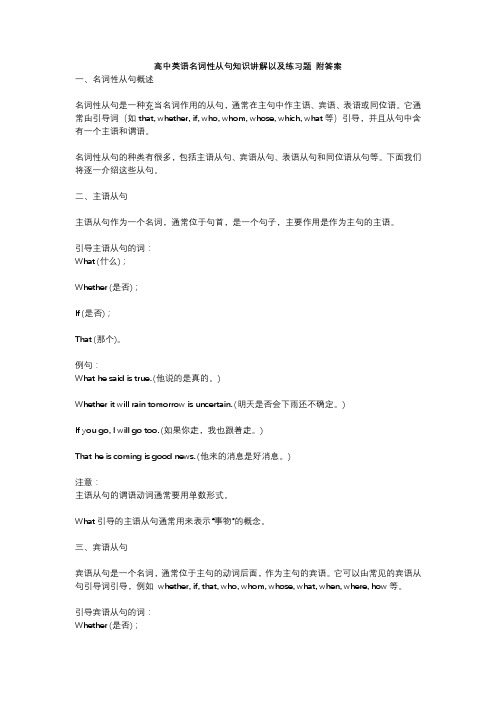
高中英语名词性从句知识讲解以及练习题附答案一、名词性从句概述名词性从句是一种充当名词作用的从句,通常在主句中作主语、宾语、表语或同位语。
它通常由引导词(如that, whether, if, who, whom, whose, which, what等)引导,并且从句中含有一个主语和谓语。
名词性从句的种类有很多,包括主语从句、宾语从句、表语从句和同位语从句等。
下面我们将逐一介绍这些从句。
二、主语从句主语从句作为一个名词,通常位于句首,是一个句子,主要作用是作为主句的主语。
引导主语从句的词:What (什么);Whether (是否);If (是否);That (那个)。
例句:What he said is true. (他说的是真的。
)Whether it will rain tomorrow is uncertain. (明天是否会下雨还不确定。
)If you go, I will go too. (如果你走,我也跟着走。
)That he is coming is good news. (他来的消息是好消息。
)注意:主语从句的谓语动词通常要用单数形式。
What引导的主语从句通常用来表示“事物”的概念。
三、宾语从句宾语从句是一个名词,通常位于主句的动词后面,作为主句的宾语。
它可以由常见的宾语从句引导词引导,例如whether, if, that, who, whom, whose, what, when, where, how等。
引导宾语从句的词:Whether (是否);If (是否);That (那个);Who (谁);Whom (谁);Whose (谁的);What (什么);When (何时);Where (何处);How (如何)。
例句:I know that he is coming. (我知道他要来。
)I wonder if he is telling the truth. (我想知道他是否说了真话。
英语从句详解
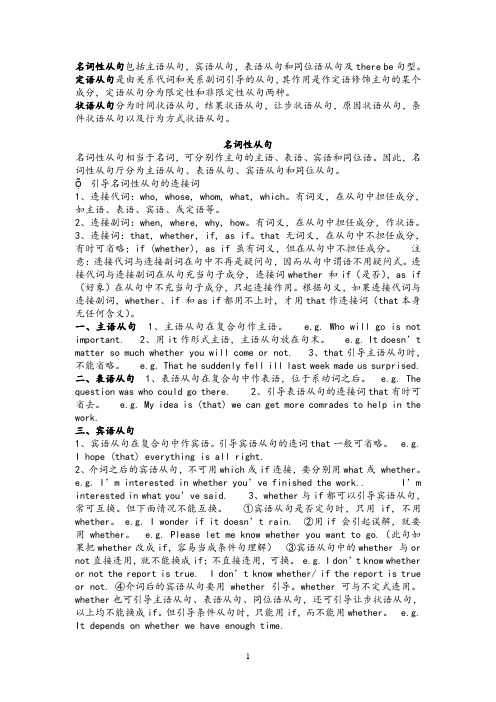
名词性从句包括主语从句,宾语从句,表语从句和同位语从句及there be句型。
定语从句是由关系代词和关系副词引导的从句,其作用是作定语修饰主句的某个成分,定语从句分为限定性和非限定性从句两种。
状语从句分为时间状语从句,结果状语从句,让步状语从句,原因状语从句,条件状语从句以及行为方式状语从句。
名词性从句名词性从句相当于名词,可分别作主句的主语、表语、宾语和同位语。
因此,名词性从句厅分为主语从句、表语从句、宾语从句和同位从句。
Ộ引导名词性从句的连接词1、连接代词:who, whose, whom, what, which。
有词义,在从句中担任成分,如主语、表语、宾语、或定语等。
2、连接副词:when, where, why, how。
有词义,在从句中担任成分,作状语。
3、连接词:that, whether, if, as if。
that 无词义,在从句中不担任成分,有时可省略;if (whether), as if虽有词义,但在从句中不担任成分。
注意:连接代词与连接副词在句中不再是疑问句,因而从句中谓语不用疑问式。
连接代词与连接副词在从句充当句子成分,连接词whether 和if(是否),as if (好象)在从句中不充当句子成分,只起连接作用。
根据句义,如果连接代词与连接副词,whether、if 和as if都用不上时,才用that作连接词(that本身无任何含义)。
一、主语从句 1、主语从句在复合句作主语。
e.g. Who will go is not important. 2、用it作形式主语,主语从句放在句末。
e.g. It doesn’t matter so much whether you will come or not. 3、that引导主语从句时,不能省略。
e.g. That he suddenly fell ill last week made us surprised.二、表语从句 1、表语从句在复合句中作表语,位于系动词之后。
英语从句大全及讲解
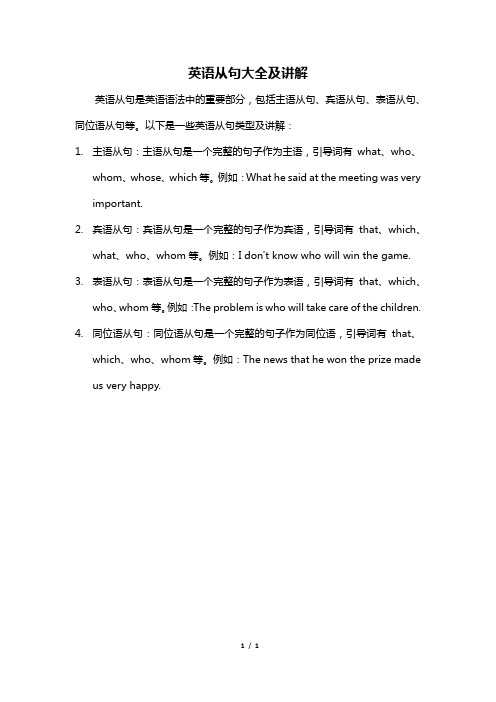
英语从句大全及讲解
英语从句是英语语法中的重要部分,包括主语从句、宾语从句、表语从句、同位语从句等。
以下是一些英语从句类型及讲解:
1.主语从句:主语从句是一个完整的句子作为主语,引导词有what、who、
whom、whose、which等。
例如:What he said at the meeting was very important.
2.宾语从句:宾语从句是一个完整的句子作为宾语,引导词有that、which、
what、who、whom等。
例如:I don't know who will win the game.
3.表语从句:表语从句是一个完整的句子作为表语,引导词有that、which、
who、whom等。
例如:The problem is who will take care of the children.
4.同位语从句:同位语从句是一个完整的句子作为同位语,引导词有that、
which、who、whom等。
例如:The news that he won the prize made us very happy.
1/ 1。
英语中的从句详细讲解ppt
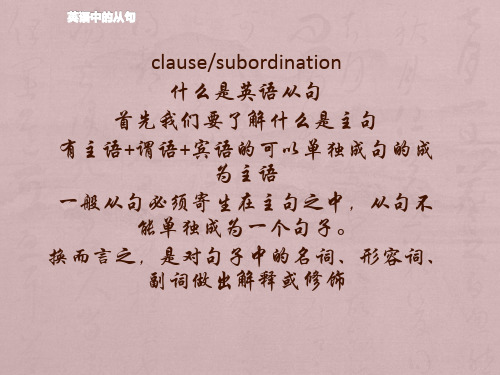
英语中的从句—名词性从句
名词性从句定性
名词性从句顾名思义在句子中起到名词成为的一部分句 子。名词在句子中可以担任主、宾、表、同位语。 在一个句子中从句占据的位置不同就是不同从句,比如 占据主语的位置就是主语从句,占据了宾语就是宾语从 句。
英语中的从句—名词性从句
引导名词性从句的关联词 从属连词 that\ whether \if\as\as if(只有连接的 功能,不充当语法成分) 连接代指词who、whom、which、what、 whose和wh+ever 连接副词where、when、why、how
如何使用关系代词和关系副词 1、看句子中的谓语动词。VT(及物动词)后无宾语,就必须用关系代词,不及物动 词若缺少介词,则必须用关系副词。 e.g. This is the town where i stayed before.
This is the town at which i stayed before. This is the town which i visited before. 2、看先行词在后面的从句子中做什么成分,来选择正确的关系词。如果先行词在后 面的从句中缺少定冠词,还需在关系词前补足定冠词。 e.g. Is this the museum which you visited yesterday. Is this museum the one you visited yesterday. This is the museum where i went yesterday
The fact surprised us.
英语中的名词性从句
whether和if常用来引导宾语从句,这时两者的含义 区别很小,一般可通用,但在以下情况下if不可替代 whether。 a、whether引导的主语从句并在句首 b、引导表语从句 eg The question is whether he will love me. c、whether从句做介词宾语 eg It depends on whether he is ready d、从句后有“or not” e、在及物运动discuss后的宾语从句中,只能用 whether f、在不定式前用whether.eg I don't know whether to go
高中英语2025届高考语法难点非限制性定语从句知识讲解

高考英语语法难点非限制性定语从句一、非限制性定语从句1.非限制性定语从句的构成非限制性定语从句对先行词进行补充说明,去掉不会影响主句的意思,通常用逗号与主句隔开。
先行词可以是主句中的某个名词或名词词组,也可以是主句中的谓语部分,或者是整个主句。
如:My grandmother,who is over eighty years old, still does housework on her own.(先行词为My grandmother)The plane was delayed,which made the passages very angry.(先行词为整个主句The plane was delayed)He sang us a folk song,which he had learned during his stay in the countryside.(先行词为a folk song)Mrs.Zhang is extremely popular amongstudents, as is common knowledge.(先行词为整个主句,从句对主句内容进行评述)2.非限制性定语从句的关系词非限制性定语从句由关系代词which、who、whom、whose或关系副词when、where等引导。
1) who、which引导非限制性定语从句并在从句中作主语。
如:Bob lent me a thousand dollars,which was exactly the amount I need.鲍勃借给我一千美元,正好是我所需要的数目。
The children,who wanted to play football, were disappointed when it rained.想踢足球的孩子们因下雨而感到失望。
The computer,which seems to play the role of a human brain, is often called an electronic brain.计算机似乎起着人脑的作用,所以常被称为电脑。
高中英语2024届高考名词性从句知识分类讲解(主语从句+宾语从句+表语从句+同位语从句)
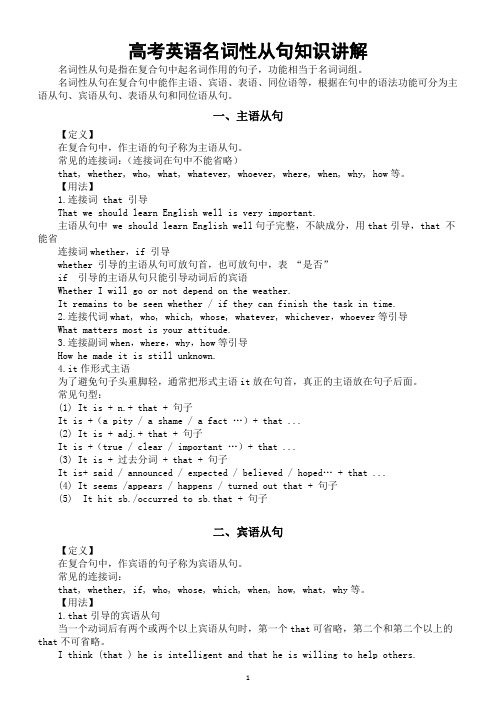
高考英语名词性从句知识讲解名词性从句是指在复合句中起名词作用的句子,功能相当于名词词组。
名词性从句在复合句中能作主语、宾语、表语、同位语等,根据在句中的语法功能可分为主语从句、宾语从句、表语从句和同位语从句。
一、主语从句【定义】在复合句中,作主语的句子称为主语从句。
常见的连接词:(连接词在句中不能省略)that, whether, who, what, whatever, whoever, where, when, why, how等。
【用法】1.连接词 that 引导That we should learn English well is very important.主语从句中 we should learn English well句子完整,不缺成分,用that引导,that 不能省连接词whether,if 引导whether 引导的主语从句可放句首,也可放句中,表“是否”if 引导的主语从句只能引导动词后的宾语Whether I will go or not depend on the weather.It remains to be seen whether / if they can finish the task in time.2.连接代词what, who, which, whose, whatever, whichever,whoever等引导What matters most is your attitude.3.连接副词when,where,why,how等引导How he made it is still unknown.4.it作形式主语为了避免句子头重脚轻,通常把形式主语it放在句首,真正的主语放在句子后面。
常见句型:(1) It is + n.+ that + 句子It is +(a pity / a shame / a fact …)+ that ...(2) It is + adj.+ that + 句子It is +(true / clear / important …)+ that ...(3) It is + 过去分词 + that + 句子It is+ said / announced / expected / believed / hoped… + that ...(4) It seems /appears / happens / turned out that + 句子(5) It hit sb./occurred to sb.that + 句子二、宾语从句【定义】在复合句中,作宾语的句子称为宾语从句。
英语四大从句完整讲解版
? that 是否可以省略?
that 在句首时绝对不能省. 口语中that引导真正的主语时,that可省.
2. It is + 名词词组(no wonder, a good thing, a pity, no surprise, ect.) + that 从句
I have no idea _w_h_e_t_h_e_r_ the meeting will be given.
? 此处是否可以用if?
that 引导的同位语从句
同位语从句
whether 引导的同位语从句
特殊疑问词引导的同位语从句
My question how I shall get in touch with him had not been answered.
同位语从句
whether 引导的同位语从句 特殊疑问词引导的同位语从句
what, wh-ever 引导的同位语 从句
Revision
that 引导的主语从句
主语从句 whether / if引导的主语从句
特殊疑问词引导的主语从句
名 词
宾语从句 what, wh-ever 引导的主语从句
主语从句
that 引导的主语从句
that 置于句首时绝对不能省, 口语中that引导真正的主语 时,that可省.
whether / if引导的主语从句
翻译:
主语从句放于句首,只能用whether 明天是否开会仍然是个问题.
? _W__h_e_th__e_r the meeting will be given is
still a problem. 当it 作形式主语,主语从句放在句末时用 whether 或if 均可。
高中英语:从句语法知识大梳理
高中英语:从句语法知识大梳理从句的基础概念由一个主句和一个或一个以上从句构成的句子叫做复合句。
所谓主句,就是在复合句中起统领作用的句子,它是全句的主体,通常可以独立存在;而从句则是复合句的一个句子成分,不能独立存在。
如:You’ll feel better after you take the pills. 吃完药丸后你会感到好一些。
主句是You’ll feel better,从句是after you take the pills,由after引导,在整个复合句中用作状语,表示时间。
注意,英语的复合句不是简单句的反面,不要将它误解为“复杂句”。
事实上,英语的简单句有时也可以比较“复杂”,而复合句也可以比较“简单”。
如:He stopped because he was tired. 他停下来是因为他累了。
这个句子比较“简单”,却是一个典型的复合句,其中的he stopped是主句,because he was tired是从句,在复合句中用作状语,表示原因。
从句的分类一般说来,一个从句在复合句充当什么成分我们就叫它为什么从句——从句在复合句用作主语,我们就叫它为主语从句;从句在复合句用作宾语,我们就叫它为宾语从句等。
如:He answered that he knew nothing about it. 他回答说他不知情。
that 引导的从句在复合句中用作动词answered的宾语,因此为宾语从句。
The trouble is that I have lost his address. 麻烦的是我把他的地址丢了。
be动词后做表语从句He was rather pleased when he won that prize. 他获奖后相当高兴。
用状语表时间,也叫时间状语从句。
名词性从句(主语从句、表语从句、宾语从句、同位语从句)主语从句、表语从句、宾语从句和同位语从句在复合句中的充当的成分和其名称相同,分别作主句的主语、表语、宾语和同位语。
英语从句知识点总结
英语从句知识点总结要想在成考英语考试中脱颖而出,首先还得对相应的从句进行复习。
下面是小编为大家整理的关于英语从句知识点总结,希望对您有所帮助。
欢迎大家阅读参考学习!高考英语从句复习资料1.状语从句的时态(1)当主句是一般将来时时,在时间、条件、让步等状语从句中用一般现在时表示将来的时间。
(2)when, before, after引导的从句的动作与主句动作的先后关系:若主从句的动作先后发生在过去,通常先发生的动作用过去完成时表示,后发生的动作用一般过去时。
before, after本身已能表达动作的先后关系,所以在含有before, after从句的句子中,主从句的动作都可用一般过去时。
2.状语从句的语气 (见虚拟语气)(1)as if /as though引导的从句以及if only.。
.(但愿,要是……就好了)句子的虚拟情况:用一般过去时表示对现在的虚拟,用过去完成时表示对过去的虚拟。
(2)if引导的非真实条件句中的虚拟情况。
3.状语从句的成分省略在时间、条件、原因、让步、方式等状语从句中,当从句的主语与主句的主语相同,且从句中含有be动词时,我们可将从句的主语(或作主语的代词it)连同be动词一起省略。
4.状语从句的强调not until引导的时间状语从句和because引导的原因状语从句可用于强调句型。
句型构成分别是:"It was not until ... that ..."和"It is/was because ... that..."。
高考英语作文写作指导引言 introduction正文 body结束语 conclusion引言 introduction1. When you are waiting in front of a theatre or at the train terminals, you will realize how important punctuality is. Punctuality is really a virtue, especially in a busycity like Shanghai. Perhaps if everybody were punctual, there would be less suffering and sorrow.正文 body2. Punctuality is the main constituent of good character. A person, who is always in time for his appointment, shows real consideration for others. On the other hand, a person who is always late shows his selfishness and thoughtlessness and he is not worthy to be friend with.constituent 构成selfishness 自私3. Some people often say that they cannot always be punctual since traffic is so heavy these days. I think traffic congestion cannot be an excuse for being late. As everybody knows that we might meet an unexpected congestion on the roads, we should leave a bit earlier for the appointment to ensure that we would not be late.traffic congestion 交通堵塞4. Some people always have a lot of excuses for coming late. When they finally arrive, they keep on saying sorry to their friends and then explain. The excuse is not always traffic congestion, sometimes they complain that they have met a friend on the road or have helped a blind man to cross the road. Some also like to blame their watches, the clocks at home or in the office. To such people, we cannot help but say sorry that we have come too early.keep on doing sth. 一直做某事5. Yet after all such smart fellows will soon find that gradually their friends become fewer and fewer. Perhaps at that time, they would realize how important punctuality is.结束语 conclusion6. To be or not to be punctual is a habit. So when we are young, we should try to be punctual every time and never be late for it is much more easily acquired in youth than when we are older.The person I shall never forgetThe person I shall never forget is Qingfengxiang. She is the best friend in my life.She often listens to me when my mood is bad. Moreover, she usually gives me some advices if I need help. Sometimes, she lends money to me if I want to buy some new clothes.I will never forget her help even though I already left Wuhan city. I think that she will be one of the most important person during my life. I hope that the friendship of us will keep forever.修改后I will never forget her help even though I have already left Wuhan city. I think that she will be one of the most important persons in my life. I hope that the friendship of us will keep forever.修改后She often listens to me when I'm in a bad mood. Moreover, she usually gives me some advices if I need help. Sometimes, she lends money to me if I want to buy some new clothes.Why We Learn EnglishEnglish is an international language now. Everyone needs to know English.When we will visit a great number of different places in the word, we need to talk about local person with English. We are interesting in books, otherwise nowadays many of the valuable books are written in English or translated into English. We in order to go through ones, so we should have a good command of English.We should try our best to learn the English language well.修改后When we visit a great number of different places in the world, we need to talk about a local person in English. Nowadays many of the valuable books are written in English or translated into English, so if we are interested in books, we should have a good command of English.修改后We should try our best to learn English well.专升本英语作文考试中,语法一定要简明扼要,而且要正确。
英语各种从句的详细讲解
英语各种从句的详细讲解英语从句(Subordination)英语从句主要有定语从句,状语从句和名词性从句(主语从句,宾语从句,表语从句,同位语从句)一.定语从句1.定语从句:由关系代词who,whom,whose,that,which;关系副词when,where,why引导。
1.The death notices tell us about people who have died during the week.2.The man(whom)you spoke to just now is my friend.3.The building whose lights are on is beautiful.4.Please find a place which we can have a private talk in.5.The knee is the joint where the thighbone meets the large bone of the lower leg.6.He still remembers the day when he went to school.7.It is no need telling us the reason why you didn't finish it in time.8.He has three sons,two of whom died in the war.9.Mr.Smith,whose wife is a clerk,teaches us English.10.In the Sunday paper there are comics,which children enjoy.2.只能用that和who引导的定语从句A.all,nothing,anything,a few,one做先行词指物时B.先行词前有形容词最高级修饰时,后面常跟that而不是which.C.先行词前有the only,the first,the last,the next,the very 等词修饰时,引导词只能用that。
- 1、下载文档前请自行甄别文档内容的完整性,平台不提供额外的编辑、内容补充、找答案等附加服务。
- 2、"仅部分预览"的文档,不可在线预览部分如存在完整性等问题,可反馈申请退款(可完整预览的文档不适用该条件!)。
- 3、如文档侵犯您的权益,请联系客服反馈,我们会尽快为您处理(人工客服工作时间:9:00-18:30)。
英语从句知识讲解Ⅰ从句1、什么叫复合句:由一个主句和一个或一个以上的从句构成的句子叫复合句。
在复合句中主句是全句的主体,从句是全句的一个成分,不能独立。
2、从句通常是用关联词来引导的。
在这里关联词还起联系从句和主句的作用。
3、主从复合句(Complex Sentences):主从复合句是指含有两个或更多主谓结构的句子,其中有一个(或更多)主谓结构充当整个句子的某一(些)成分。
充当定语的句子叫定语从句,充当状语的句子叫状语从句,充当主语、宾语、表语或同位语的句子叫名词性从句。
主句与从句之间用关联词连接起来。
关联词除了在主语与从句之间起连接作用外,绝大多数不但本身有意义,而且还要在从句中充当句子成分。
但是,引导名词性从句的whether或if有“是否”之意,但不在从句中充当句子成分,‘引导名词性从句的that没有任何意义,也不在从句中充当句子成分。
esⅡ定语从句一、定语从句1.定语从句三步:第一找出先行词;第二看先行词在定语从句中的语法功能(做主语、宾语或状语);第三选择合适的关联词。
2.定语从句在选择关连词that 与which时,常常容易出错,所以应记住什么时候只能用that,什么时候只能用which.(1)只能用that 的情况归纳4种:即先得词被序数词最高级修饰过;先行词为all 、everything、nothing 等不定代词;先行词同时是人和物并列时;最后先行词分别被the only 、the very the same、the last 修饰。
请看下列四组例句,注意其先行词:①The first thing that we should do is to work out a plan .②I t almost seemed as if the good man were trying to teach us all that he knew at this lesson .③Later my father and Mr.Crosset talked for about half an four of things and persons that they remembered in school.④This is the very dictionary that I want to find .(2)只用which is 情况有两种情况:一是非限制性定语从句,关连词要用which;二是做介词宾语时只能用which。
请看下列两组例句:I said nothing , which made him more angry .I have the book about which you are talking .3.在定语从句的非限制性定语中,which 和as 是容易混淆的。
在很多情况下两者兼可互换,但在下列情况中不可互换:(1)通常As 可以放在整句的句首,而which,只能在逗号之后,as 本身含有“正如”,as 在定语从句中既可是主语也可做宾语As appear from her paper ,she has read widely in Romantic literature.She is remarkable, as I have told you .(2)which 在做非限制性定语从句关联词时可以无明确先行词,指前句整个的意思,如:she has warried again,which surprises us .四、在定语从句中,许多人往往分不清all that 和what,what 实际上只引导名词性从句,它相当于all that 两个字,例如:All that I know is that he has made up his mind to heave the country for a new place.= what I know is that ……二.限制性定语从句1.先行词是人且在从句中做主语或宾语,关联词一般用who.e.g. This is the doctor who saved the boy’s life .这就是救了孩子生命的医生。
She is the new student whom I want to introduce to you . 她就是我要介绍给你的新学生(who在从句中做主语,whom在从句中做宾语,口语中who可以代替whom,也可以被省去,但做介词宾语时只能用whom)2.先行词是物且在从句中做主语或宾语,关联词用which.e.g. Please p ass me the book which is lying on the table. 请递给我摆在桌上的那本书。
The novel which Tom bought is very interesting. 汤姆买的小说很有意思。
Can you lend me the magazine about which you talked yesterday? 你能把昨天谈到的那本杂志借给我吗?(which在从句中做主语。
which充当宾语时可以省去。
which做介词宾语不可省)3.先行词是人或物的,关联词用whose.e.g. The professor whose daughter teaches you English is Dr. Williams 那位教授是威廉斯他的女儿教你英语。
=The professor, the daughter of whom teaches you English is Dr. Williams.The bike whose brake was damaged has now been repaired. 那辆坏了闸的自行车现在已经修好了。
=The bike the brake of which was damaged has now been repaired(whose在从句中做定语指某人的也可以用…of wh om代替whose指物时也可以用…of which 代替whose)4.先行词是时间,在定语从句中做时间状语,关联词用whene.g. He came at a time when we. needed him most. 他在我们最需要的时候来了。
We’ll never forget the day when the People’s Republic of China was founded.我们永远不会忘记中华人民共和国成立的那一天。
注:先行词是time, minute, moment, next tim很少用关系副词when,可用that 但通常省去。
5.先行词是地点,在定语从句中做地点状语,关联词用wheree.g. This is the room where he put up for the night. 这就是他渡过夜晚的那房子。
6.先行词是原因在定语从句中做原因状语,先行词用whye.g. I know the reason why she studies so well . 我知道她学习好的原因。
*7.关联词用that.(1)that指人做主语e.g. The woman that is playing the piano is Miss Zhang. 正在弹钢琴的那位妇女是张小姐。
(2)that指物做主语.e.g. I’d like to see t he films that are just on show. 我想看那些刚上映的电影。
(3)先行词分别表示人和物,关系代词要用that,不用who或whiche,g, They talked for about an hour of things and persons that they remember in the school.他们谈起他们所记得起的学校里的人和事,谈了大约有半个小时。
(4)先行词表示物,关系代词用that不用which, 在从句中做宾语可省去。
如果先行词是人时,关系词不受制约,用that或who (whom)均可。
e.g. I’ll tell you all(that )I know about it . 我要告诉你我所知道这件事的一切情况。
Is there anything (that) I can do for you? 有什么我可以帮助做的事吗?I’ve brought everything (that )you need. 我把你需要的东西都拿来了。
(当先行词是all, littlemuch和some,any every ,no构成的合成代词时,关联词用that)(5)先行词被形容词最高级或序数词修饰时定语从句用that引导。
e.g. This is the best film that I have seen . 这是我看过的最好的一部电影。
The first place that we’ll visit is Beijing Library.我们要参观的第一个地方是北京图书馆(6)先行词被the only, the very,the same 等修饰时用关系代词that.e.g. He is the only person that is believable. 他是唯一可靠的人。
John is the very person that she wants to see. 约翰正是她要见的人。
(7)当主句以who、which开头的特殊疑问句时,定语从句要用thate.g. Who is the man that is talking with Tom ? 正在和汤姆谈话的人是谁?Which of the books that you bought is easy to read? 你买的那些书中哪一本容易读。
三. 非限制性定语从句(1)先行词是人先行词用who或whome.g. George ,who is my classmate, has won a scholarship. 乔治获得了奖学金,他是我的同学。
Dr. Li , whom I know very well, will come here tomorrow. 李大夫明天将来这儿,我跟他很熟悉。
(who, whom不能省去,也不能用that代替)(2)先行词是物,关联词用whiche.g. I gave him a New Year card ,which he enjoyed very much. 我给他一张贺年卡,他很喜欢它。
(which指物,不可省去,也不能用that代替)(3)没有固定的先行词而是一个句子,关联词用whiche.g. He studies hard at school when he was young, which leads to his success in his later life .他年轻时在校学习努力,这导致了他后来生活中的成功。
